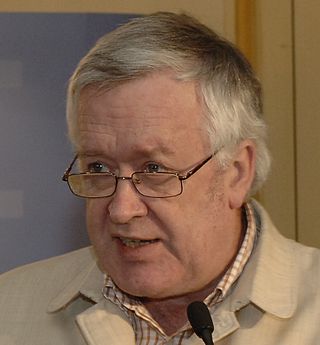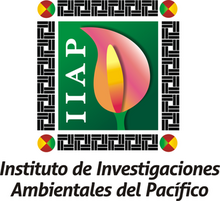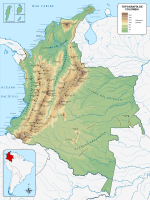The Worldwatch Institute was a globally focused environmental research organization based in Washington, D.C., founded by Lester R. Brown. Worldwatch was named as one of the top ten sustainable development research organizations by Globescan Survey of Sustainability Experts.

The Scripps Institution of Oceanography, located in San Diego, California, is one of the oldest and largest centers for ocean and Earth science research in the US. Originally founded in 1903, since becoming part of the University of California system in 1912, the institution has expanded its scope to include studies of the physics, chemistry, geology, biology, and climate of Earth.

El Niño–Southern Oscillation (ENSO) is an irregular periodic variation in winds and sea surface temperatures over the tropical eastern Pacific Ocean, affecting the climate of much of the tropics and subtropics. The warming phase of the sea temperature is known as El Niño and the cooling phase as La Niña. The Southern Oscillation is the accompanying atmospheric component, coupled with the sea temperature change: El Niño is accompanied by high air surface pressure in the tropical western Pacific and La Niña with low air surface pressure there. The two periods last several months each and typically occur every few years with varying intensity per period.

SRI International (SRI) is an American nonprofit scientific research institute and organization headquartered in Menlo Park, California. The trustees of Stanford University established SRI in 1946 as a center of innovation to support economic development in the region.

Hans von Storch is a German climate scientist. He is a professor at the Meteorological Institute of the University of Hamburg, and Director of the Institute for Coastal Research at the Helmholtz Research Centre in Geesthacht, Germany. He is a member of the advisory boards of the journals Journal of Climate and Annals of Geophysics. He worked at the Max Planck Institute for Meteorology from 1986 to 1995 and headed the Statistical Analysis and Modelling research group there.

The Carl von Ossietzky University of Oldenburg is a university located in Oldenburg, Germany. It is one of the most important and highly regarded educational facilities in northwestern Germany and specialises in interdisciplinary and sustainable development studies and renewable energy studies with focus on solar and wind energy.

Peter H. Gleick is an American scientist working on issues related to the environment. He works at the Pacific Institute in Oakland, California, which he co-founded in 1987. In 2003 he was awarded a MacArthur Fellowship for his work on water resources. Among the issues he has addressed are conflicts over water resources, water and climate change, development, and human health.

The Cooperative Institute for Arctic Research is designed to be a focal point for interactions between the National Oceanic and Atmospheric Administration (NOAA)/Office of Oceanic and Atmospheric Research (OAR) and the Arctic research community through the University of Alaska for research related to the Western Arctic/Bering Sea region.

The Kyiv National University of Construction and Architecture – better known under its former name Kyiv Civil Engineering Institute – is the largest and most important building and architectural university of Ukraine located in the nation's capital, Kyiv.

The University of Duisburg-Essen is a public research university in North Rhine-Westphalia, Germany. In the 2019 Times Higher Education World University Rankings, the university was awarded 194th place in the world. It was originally founded in 1654 and re-established on 1 January 2003, as a merger of the Gerhard Mercator University of Duisburg and the university of Essen. It is based in both the cities of Duisburg and Essen, and a part of University Alliance Metropolis Ruhr.
The Harriman Institute, the first academic center in the United States devoted to the interdisciplinary study of Russia and the Soviet Union, was founded at Columbia University in 1946, with the support of the Rockefeller Foundation, as the Russian Institute.
The Institute of Asian Research (IAR) at the University of British Columbia is a research institute founded in 1978 and has been the foremost research centre in Canada for the inter-disciplinary study of Asia. With a broad geographic reach extending to China, India and South Asia, Japan, Korea and Southeast Asia, the institute conducts research and teaching on policy-relevant issues informed by language and area studies.

The German Archaeological Institute is a research institute in the field of archaeology. The DAI is a "federal agency" under the Federal Foreign Office of Germany.
The Institute for Energy and Environmental Research (IEER) is an anti-nuclear organization which focuses on the environmental safety of nuclear weapons production, ozone layer depletion, and other issues relating to energy. IEER publishes a variety of books on energy-related issues, conducts workshops for activists on nuclear issues, and sponsors international symposia and educational outreach projects. IEER was established in 1987 and is based in Takoma Park, Maryland.
The Amazonian Scientific Research Institute SINCHI is a non-profit research institute of the Government of Colombia charged with carrying out scientific investigations on matters relating to the Amazon Rainforest, the Amazon River and the Amazon Region of Colombia for its better understanding and protection. The word SINCHI, is a word in Quechua that means "strong" or "fierce".

The Institute for Chemistry and Biology of the Marine Environment of the Carl von Ossietzky University of Oldenburg is one of the marine science institutes at the German coast and the only university-based marine research institute in Lower Saxony, Germany. The ICBM is located on the campus Wechloy in Oldenburg, with locations in Wilhelmshaven and on the island of Spiekeroog. The ICBM operates the Wadden Sea time series station Spiekeroog (WSS) and several research vessels.

The Industrial and Mining Water Research Unit is one of several research entities based in the School of Chemical and Metallurgical Engineering at the University of the Witwatersrand, Johannesburg. It provides research as well as supervision to masters and doctorate students within the University, as well as consulting to industry.













